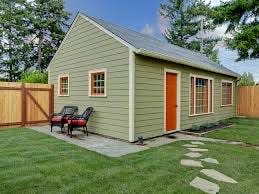Measure would allow for backyard dwellings to combat housing crisis, rising rent in Jacksonville

City Council members are exploring a way to help Jacksonville residents navigate the ongoing housing crisis by making a change to existing zoning laws. It would allow for small lodging units with kitchens on the backlots of single-family homes.
If passed, the “Keeping Our Families Together Act” would allow single-family homes to be zoned for "accessory dwelling units," meaning small buildings with a kitchen, bathroom and room. Previously, homeowners could build small apartments, but they could not include a kitchen.
Councilman Rory Diamond introduced and advocated for the bill this week at a Land Use and Zoning Committee public hearing. He and the other committee members agreed to push the bill through to next week’s general City Council meeting where it could be voted into law.
Diamond clarified at the meeting that accessory dwelling units do not follow the same specifics as "tiny homes" — which are allowed in certain parts of the city.
Tiny homes of Jacksonville: "Tiny Houses on Navaho: Jacksonville's first tiny-home community an answer to affordable housing"
The dwellings have to be built in the same architectural design and color of the original home, Diamond said. They also have to stay within certain dimensions: either equaling up to 25% of the square footage of the main structure or up to 750 square feet, whichever is smaller.
“It allows a single family to build something in the back of their home where they could keep their family together,” Diamond said at the committee meeting. Children returning from college, elderly family members or extended family could live in the homes.
Diamond also said families could alternatively rent out the dwellings in order to help make mortgage payments on the original residence. New homeowners could therefore account for the rent payments as possible income, allowing them to qualify for homes they otherwise could not.
For renters, Diamond said the homes could offer a reprieve from the rising rents of average-sized apartments or homes.
Rising rent: "Inflated rent in Jacksonville attracts national attention with 60 Minutes report"
Rising home prices: "How hot is the real estate market in Duval County? Home prices rise to reach $305K"
In a phone call with The Florida Times-Union, Diamond specified that the act would not apply to all of Duval County. Independent communities with their own zoning committees, as well as neighborhoods with homeowners associations with rules disallowing such dwellings, would not be subject to the measure.
He also wrote into the act, he told The Times-Union, that the homeowners would have to live in the primary residence. He said he wanted to reassure residents that developers could not come in just to rent out the homes and accessory dwellings.
During the committee meeting, Diamond said there was the capacity to build as many as 100,000 accessory dwellings in the upcoming years. If the act is passed, he said the possibilities needed to be publicized in order to help counteract the city’s current housing dilemma.
“I don’t think that would happen overnight, but if it happened over a couple of years, that’s a lot of new capacity coming in at very affordable rates,” Diamond said.
This article originally appeared on Florida Times-Union: Jacksonville housing plan would allow for accessory dwelling units
